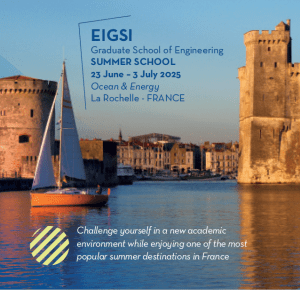Summer School “Ocean & Energy”
23 June – 3 July 2025
EIGSI Summer School is a great opportunity to learn more about the ocean and natural resources.
You will get the chance to combine high-quality, hands-on courses with outdoor activities while also experiencing the closeness of the ocean.

Summer School Programme Coordinator
Rose Campbell, summer school coordinator, is a researcher in the field of marine sciences.
Her research interests include numerical modeling, optimization, oceanography, and software development.
She holds a PhD and Masters in Oceanography from Aix-Marseille University (France), and a BSc of Science/Mathematics from the University of Ottawa (Canada). She currently teaches at EIGSI Engineering School in La Rochelle, France.
A team of international lecturers will join us in La Rochelle for the Summer School.

Qui peut participer ?
Les étudiants ayant au moins deux années d’études post-secondaire en sciences ou en ingénierie.
1. Inscription
Dépôt des candidatures à la Summer Shcool de l’EIGSI, en écrivant à : Mobility@eigsi.fr
D’octobre 2023 au 29 mars 2024
2. Validation par l’EIGSI
15 Avril 2024
3. Frais de participation
Étudiants d’universités partenaires : 700€
Étudiants d’universités non partenaires : 2 000€
Inclus : Cours, hébergement (au sein de la résidence de l’EIGSI, idéalement situé à 100m de l’école), dîner d’accueil, activités, visites.
Non inclus : Déplacements aller et retour à La Rochelle, repas.
4. Summer School
24 Juin – 4 Juillet 2024

Course details
Module 1 : Ocean, Atmosphere & Climate
This course will give students a foundation to understand the sources of marine energies. The impacts of climate change on these resources will be discussed. Students will observe tidal dynamics at the nearby beach.
Module 2 : Natural Resources & the Blue Economy
In this course, students will review the interaction between humankind and the ocean, with a focus on the extraction of resources. Discussion of how climateresilient solutions can be used to reduce human impacts. An overview of maritime transportation systems will be contextualized by a site visit to the commercial harbour of La Rochelle.
Module 3 : Mapping the Potential for Marine Renewable Energy
Students will collect information about currents and/or winds over a given geographic area over a period of time from European open data bases. This labbased course uses GIS software (QGIS).
Module 4 : Design Challenge
Students will divide into small groups to face this design challenge. Learners will be given a short brief and a set of materials. The final result will be built and put to test at the nearby beach during a final competition.
A variety of social and cultural activities will complement the academic programme.
 Dowload academic programme 2025
Dowload academic programme 2025